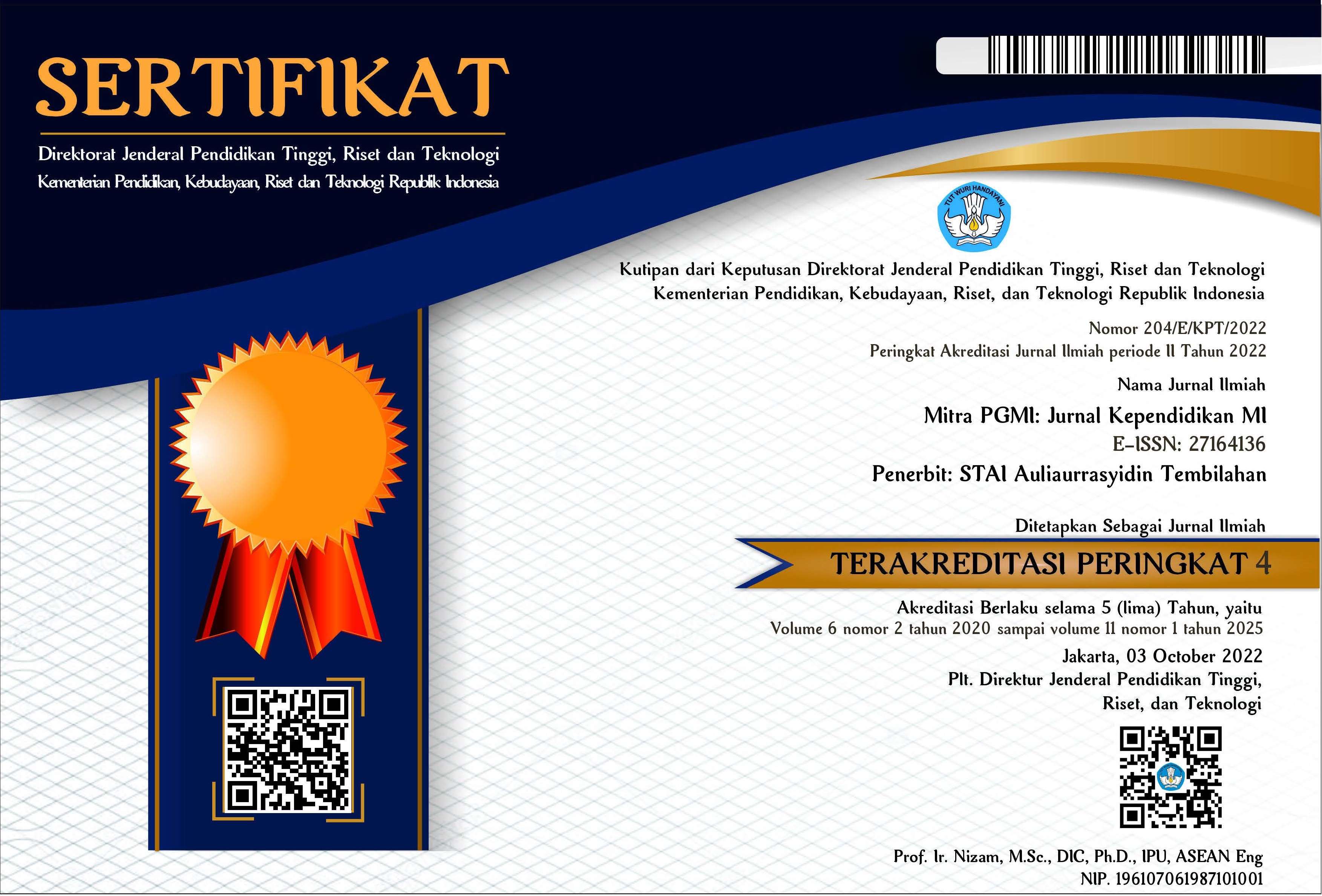Peran Guru Pendidikan Agama Islam dalam Meningkatkan Perilaku Islami Siswa di SD Negeri 01 Indralaya
DOI:
https://doi.org/10.46963/mpgmi.v8i1.405Keywords:
Teachers, Islamic Religious Education, Islamic BehaviorAbstract
Islamic Religious Education teachers are expected to be able to teach, guide, and provide good examples to students on how to behave properly. The role of Islamic Religious Education teachers has a central position in shaping student behavior in schools, if teachers are able to direct students to behave Islamically, it is not impossible in the school to create a culture of Islamic behavior. This research uses descriptive qualitative research. The data obtained are in the form of primary and secondary data. The data analysis used is data reduction, data presentation and conclusion drawing as the final result of this research. The research results obtained are as follows: First, namely the Role of Islamic Religious Education Teachers in Improving Students' Islamic Behavior at SD Negeri 01 Indralaya including: a. using the lecture method and the habituation method, b. maximize religious facilities in schools, c. Cultivate 5S, d. always try to set a good example or role model for students. Second, the supporting factors of Islamic religious education teachers in improving the Islamic behavior of students at SD Negeri 01 Indralaya are: a. there is cooperation between teachers; b. the participation of parents of students; c. sanctions for students who violate. While the inhibiting factors are: a. the absence of a prayer room so that the process of forming Islamic behavior is hampered; b. lack of books on Islamic studies
Downloads
References
Djamarah, S. B. (1994). Prestasi Belajar dan Kompetensi Guru. Surabaya: Usaha Nasional.
Juniarni, C. (2018). Partisipasi Orang Tua dalam Pendidikan Baca Tulis Al-Qur'an. Jurnal ITIBAR, 25.
Juniarni, C. (2020). Pengantar Manajemen PAUD. Jambi: Penerbit Qiarra Media.
Juniarni, C., Djudddah, H., Rochbani , I., Abidin, Z., Novita, M., Aprianto, I., et al. (2020). Manajemen Perpustakaan Sekolah. Jambi: Qiara Media.
Muhaimin. (2006). Nuansa Baru Pendekatan Islam. Jakarta: PT. Raja Grafindo.
Mulyasa. (2013). Menjadi Guru Profesional Menciptakan Pembelajaran Kreatif. Bandung: PT. Remaja Rosdakarya.
Nasution, W. N. (2011). Teori Belajar dan Pembelajaran. Medan: Perdana Publishing.
Nurdin, M. (2010). Kiat Menjadi Guru Profesional. Yogyakarta: AR. Ruzz Media Group.
Tafsir, A. (1992). Ilmu Pendidiakn dalam Persepektif Islam. Bandung: Remaja Rosdakarya.
Tohirin. (2006). Psikologi Pembelajaran Pendidikan Agama Islam. Jakarta: PT. Raja Grafindo.
Yusuf, S. (2005). Psikologi Belajar Agama: Persepektif Agama Islam. Bandung: Pustaka Bani Quraisy.
Downloads
Published
Issue
Section
License
Copyright (c) 2022 Cittra Juniarni Almujahid, Abdallah Abdallah, Helyani Helyani

This work is licensed under a Creative Commons Attribution-ShareAlike 4.0 International License.
Authors who publish with this journal agree to the following terms:
1. Copyright on any article is retained by the author(s).
2. The author grants the journal, right of first publication with the work simultaneously licensed under a Creative Commons Attribution shareAlike 4.0 International License that allows others to share the work with an acknowledgment of the work’s authorship and initial publication in this journal.
3. Authors are able to enter into separate, additional contractual arrangements for the non-exclusive distribution of the journal’s published version of the work (e.g., post it to an institutional repository or publish it in a book), with an acknowledgment of its initial publication in this journal.
4. Authors are permitted and encouraged to post their work online (e.g., in institutional repositories or on their website) prior to and during the submission process, as it can lead to productive exchanges, as well as earlier and greater citation of published work.
5. The article and any associated published material is distributed under the Creative Commons Attribution-ShareAlike 4.0 International License








2.png)


